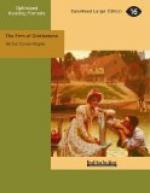As she sat opposite to him she could not keep her eyes from his hard angular face, every rugged feature of which was exaggerated by the flickering yellow light above him. Those deep-set eyes and sunken cheeks had been familiar to her for years. How was it that they now, for the first time, struck her as being terrible? Was it that new expression which had appeared upon them, that hard inexorable set about the mouth, which gave a more sinister character to his whole face? As she gazed at him an ineffable loathing and dread rose in her soul, and she could have shrieked out of pure terror. She put her hand up to her throat with a gasp to keep down the sudden inclination to cry out. As she did so her guardian glanced over the top of the note-book with his piercing light grey eyes.
“Don’t get hysterical!” he cried. “You have given us trouble enough without that.”
“Oh, why are you so harsh?” she cried, throwing out her arms towards him in eloquent entreaty, while the tears coursed down her cheeks. “What have I done that is so dreadful? I could not love your son, and I do love another. I am so grieved to have offended you. You used to be kind and like a father to me.”
“And a nice return you have made me! ‘Honour your father,’ says the good old Book. What honour did you give me save to disobey every command which I have ever given you. I have to blame myself to some extent for having allowed you to go on that most pernicious trip to Scotland, where you were thrown into the company of this young adventurer by his scheming old fool of a father.”
It would have been a study for a Rembrandt to depict the craggy, strongly lined face of the old merchant, and the beautiful pleading one which looked across at him, with the light throwing strange shadows over both. As he spoke she brushed the tears from her eyes and an angry flush sprang to her cheeks.
“You may say what you like of me,” she said bitterly. “I suppose that is one of your privileges as my guardian. You have no right, however, to speak evil of my friends. ‘He who calleth his brother a fool,’ I think the good old Book says something of that.”
Girdlestone was staggered for a moment by this unexpected counter. Then he took off his broad-brimmed hat and bowed his head with drooping lids.
“Out of the mouths of babes and of sucklings!” he cried. “You are right. I spoke too warmly. It is my zeal for you which betrays me.”
“The same zeal which made you tell me so many things which I now know to be untrue about Mr. Dimsdale,” said Kate, waxing more fearless as her mind turned to her wrongs.
“You are becoming impertinent,” he answered, and resumed his calculations in his note-book.
Kate cowered back into her corner again, while the train thundered and screeched and rattled through the darkness. Looking through the steamy window, nothing was to be seen save the twinkle here and there of the lights of the scattered country cottages. Occasionally a red signal lamp would glare down upon her like the bloodshot eye of some demon who presided over this kingdom of iron and steam. Far behind a lurid trail of smoke marked the way that they had come. To Kate’s mind it was all as weird and gloomy and cheerless even as the thoughts within her.




